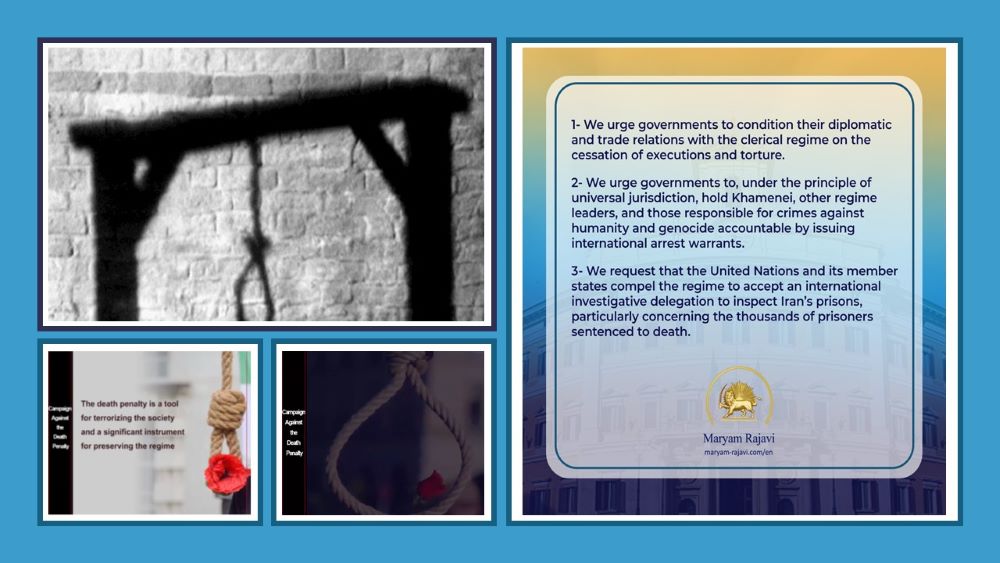
On October 10th, the Global World Day Against the Death Penalty, a collective voice rises against a practice that undermines human dignity. This day serves as a crucial reminder of the ongoing struggle against capital punishment, particularly in Iran, where the regime’s execution rates have surged alarmingly.
The Situation in Iran
Since Masoud Pezeshkian assumed office, Iran has witnessed over 220 executions, highlighting an urgent need for international intervention and solidarity. The Iran Human Rights Monitor (Iran HRM) calls upon politicians, Nobel Laureates, and activists worldwide to join in defending human rights and to support the #StopExecutionsinIran campaign. This initiative is not merely a protest; it is a plea for global abolitionists to unite against the rampant violations occurring within Iranian prisons.
Join Iran-HRM's Week of Action
Global #WorldDayAgainsttheDeathPenalty
On October 10th, people worldwide will unite against the death penalty, a practice that violates human dignity.
Since Masoud Pezeshkian took office, over 220 executions have taken place in Iran, underscoring… pic.twitter.com/UHa0L1SWel— IRAN HRM (@IranHrm) October 4, 2024
The “No to Executions” Campaign
For over 36 weeks, Iranian prisoners across 21 prisons have engaged in hunger strikes every Tuesday, protesting against the ongoing executions. This grassroots movement reflects a broader desire for justice and an end to state-sanctioned killings. Mrs. Maryam Rajavi, President-elect of the National Council of Resistance of Iran (NCRI), emphasizes the regime’s fear of popular uprisings as a driving force behind its brutal execution policies. She states:
“Ali Khamenei, fearing the explosive anger of the people and the escalation of popular uprising, has accelerated the execution and killing machine.”
On specific dates like October 1st and 2nd, 13 and 17 prisoners were executed respectively, showcasing the regime’s relentless approach to suppress dissent through fear.
Executions of prisoners have continued relentlessly. Thirty #executions were carried out on October 1 and 2 alone. Since August, when Pezeshkian took office, at least 255 prisoners have been executed.
As long as the clerical regime remains in power, neither torture and executions…— Maryam Rajavi (@Maryam_Rajavi) October 6, 2024
A Call for International Action
Mrs. Rajavi urges the international community to take a stand against these atrocities. She calls for diplomatic and trade relations with Iran to be contingent upon halting torture and executions. The call is clear:
“The regime’s leaders should face justice for four decades of crimes against humanity and genocide.”
This demand reflects a growing recognition that executions are not merely punitive measures but tools of oppression aimed at maintaining control over an increasingly restless populace.
1-@Maryam_Rajavi: Ali Khamenei, fearing the explosive anger of the people and the escalation of popular uprising, has accelerated the execution and killing machine. #WorldDayAgainstTheDeathPenalty #Iran #StopExecutionsInIran #NoImpunity4Mullahspic.twitter.com/P7lYRN5Dea
— Iran Freedom (@4FreedominIran) October 7, 2024
The Broader Implications
The Iranian regime’s reliance on executions as a survival strategy reveals its inherent instability. As Mrs. Rajavi points out,
“Executions under whatever pretext or charge show the mullahs’ intention to preserve and escalate repression.”
This acknowledgment underscores that the fight against capital punishment is not only about individual lives but also about dismantling a regime that thrives on fear and repression.
The executions in #Iran, under whatever pretext or charge, show the mullahs’ intention to preserve and escalate repression and general terror.
In fact, the government’s killing machine is at work day and night. They increase and decrease the number of hangings upon Khamenei’s… pic.twitter.com/QX6d92CDgk— Maryam Rajavi (@Maryam_Rajavi) September 19, 2024
Conclusion
As we observe the Global World Day Against the Death Penalty, it is imperative to amplify voices calling for justice and human rights in Iran. The “No to Executions” campaign represents a beacon of hope for many who suffer under tyranny. By standing together, we can challenge oppressive Iran’s regime and advocate for a future where human rights are upheld, free from the shadow of executions.